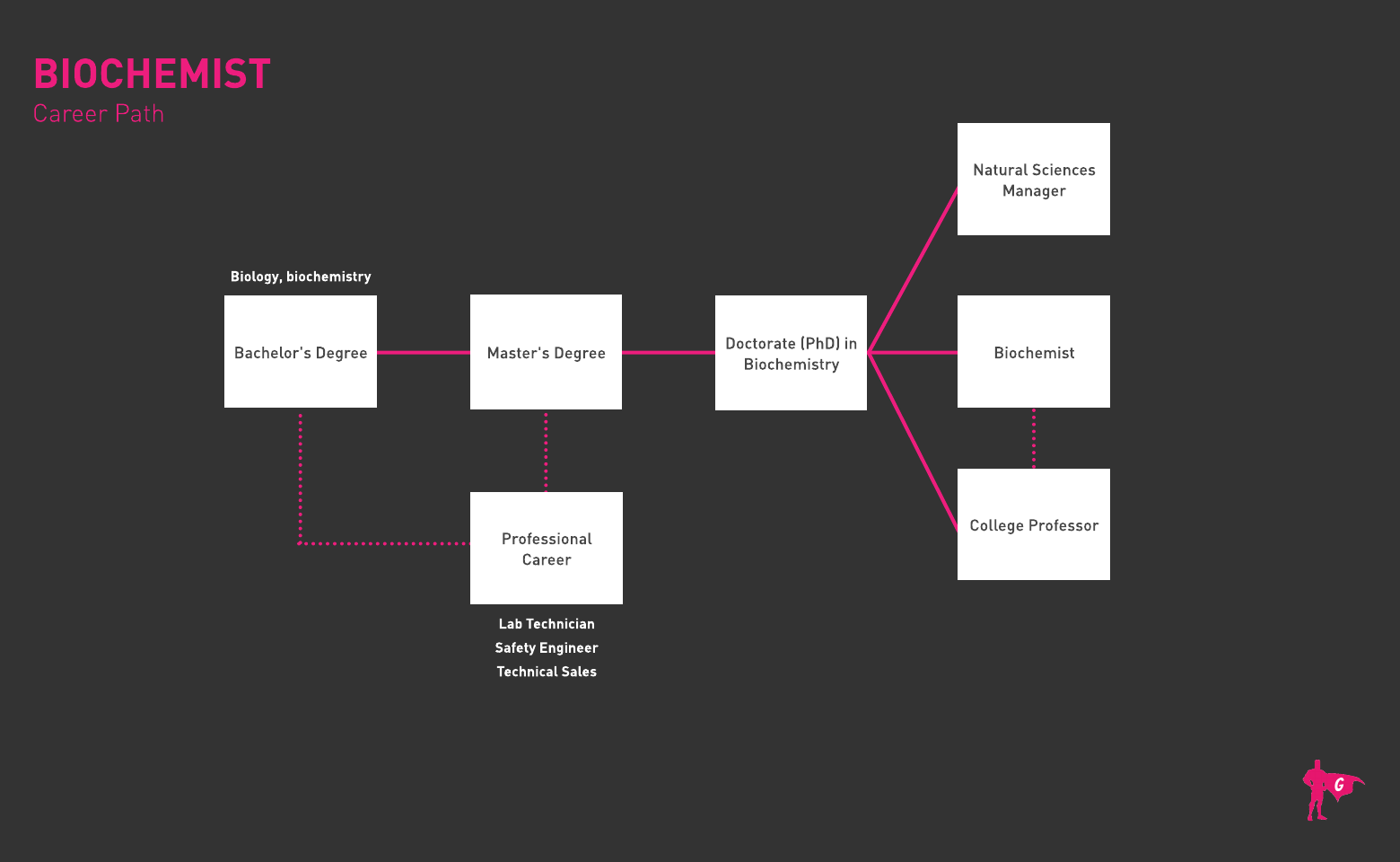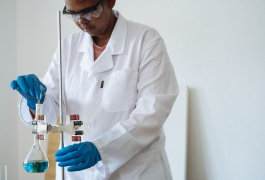Spotlights
Analytical Research Chemist, Biophysics Researcher, Scientist, Research Scientist, Molecular Biologist, Biochemical Scientist, Biotechnology Researcher, Pharmaceutical Scientist, Protein Chemist, Geneticist, Cell Biologist, Microbiologist, Bioanalytical Chemist
A biochemist studies the chemical principals of living things, as well as the processes that help living things to live. They lead a laboratory or work with a team of assistants and technicians to conduct experiments that help them learn about living things.
They may study animal biology, cell development, diseases, or other areas of biology.
Biophysicists are similar scientists, but they focus on physical principles.
- As you move up, you are able to study the things that really interest you.
- Biochemists play important roles in new technologies that benefit many people and places.
- There is always new information to learn and explore – new discoveries lead to new questions!
- Most of your co-workers are dedicated to your work, which creates strong teamwork and a good work environment
These scientists work in an office and laboratory setting. This is typically a full-time position with a Monday-Friday work schedule. You may work more hours if meeting deadlines, or if an experiment is time-sensitive.
They use technology such as computer modeling to analyze living things and their components. This might be DNA or proteins that help keep bodies healthy.
- Create and lead experiments in the lab.
- Read work done by other scientists, so you are knowledgeable about trends in your field.
- Write grants for funding, or support a grant writer in your organization.
- Write reports and papers about your experiments and submit to publishers.
- Use experiments to learn more about DNA, drug uses, creating synthetic compounds, or other biological questions.
There are two main fields of both Biochemistry and Biophysics: Basic Research and Applied Research.
Basic Research is concerned with learning for learning’s sake. They want to improve the level of knowledge humans have. These scientists will often work for public universities or colleges. The questions being answered by the research are created by the scientist.
Applied Research answers specific questions. It is often used to produce products. These can help a farmer with their crops, a new treatment for a disease, or even finding faster ways to create biofuels – fuel made from plants. The questions the scientist is trying to answer is assigned by a company or other private entity.
SOFT SKILLS
- Able to communicate orally, but more emphasis on written communication
- Logical reasoning – able to figure an answer out by using available data, without being told a specific answer.
- Creativity – able to look at problems in new ways.
- Active learning and a strong desire to learn more
- Strong questioning skills
TECHNICAL SKILLS
- Strong computer skills – scientific software and graphic imaging software such as Adobe Photoshop
- Database and spreadsheet knowledge
- Intermediate computer programming skills are needed – Python and Perl
- Pharmaceutical/Medical Manufacturing
- Colleges/Universities or other school settings
- Technical Consulting Services – Helping companies sell their products
Becoming a biochemist means earning a Ph.D. This means you will be in school for six years before you even start your Ph.D.! Doctorate programs for biochemistry take four to six years. This means you could attend school for almost twelve years.
After earning your doctorate, it will likely take you up to two years before you find a permanent job. You will need to work and support your education during this time – it can take almost 14 years to become a Biochemist.
- As a science, Biochemistry is always evolving. Some trends evolving:
- Using 3D modelling to explore DNA and organisms
- Identifying gene therapies for disease and other health problems
- Exploring biological based solutions for environmental problems.
- Exploring anatomy and the inner workings of organisms
- Biochemists often loved science classes as kids
- Asking a lot of questions about everything – especially “How?” and “Why?” questions.
- Biochemists often hold PhDs after completing a bachelor’s and master’s in biochemistry, biology, physical science, or sometimes even engineering
- Common courses include math, physics, biological science, chemical science, toxicology, genetics, proteomics, bioinformatics, and plenty of lab research
- Per O*Net Online, 25% of workers in this field only have a bachelor’s, 25% have a PhD, and 40% have some post-doc training
- Post-doc training may occur while working in research jobs, for example at universities
- Lab experience is critical and obtained via college programs plus internships
- Licensure and certification aren’t required for Biochemists in general; however, some positions may require certification in a specialized area
- The American Society for Biochemistry and Molecular Biology (ASBMB) accredits bachelor’s degree programs in biochemistry and molecular biology
- Students in ASBMB-accredited programs can opt to take the ASBMB certification exam
- The exam features 12 mainly free response questions, is offered online, and can only be attempted once during a student’s undergrad career
- Bắt đầu hành trình giáo dục lâu dài của bạn với nền tảng vững chắc về sinh học, toán học và hóa học
- Tích lũy kinh nghiệm trong phòng thí nghiệm thông qua thực tập có lương
- Decide which type of Biochemistry you’ll want to specialize in, such as structural biology, enzymology, and metabolism
- Think about which career field you might be interested in, such as medical and biotechnological research, pharmacology, genetic research, or military research
- Tham gia các tổ chức chuyên nghiệp để tìm hiểu, phát triển và kết nối mạng (xem Tài nguyên > trang web được đề xuất của chúng tôi để biết danh sách các tùy chọn)

- Roughly 11% of Biochemists work in the areas of pharmaceuticals and medicine manufacturing; 7% work at colleges or universities
- Các dự án BLS tăng cơ hội việc làm trong một số lĩnh vực nhất định như nghiên cứu y sinh, R&D công nghệ sinh học, năng lượng, sản xuất thực phẩm và bảo vệ môi trường
- Đảm bảo bạn có sự kết hợp phù hợp giữa thông tin học tập, kinh nghiệm trong phòng thí nghiệm, chứng chỉ áp dụng và kinh nghiệm làm việc có liên quan cho các công việc bạn ứng tuyển
- Biochemist internships are a great way to get experience in the field
- Kiểm tra các cổng thông tin việc làm phổ biến như Indeed, Simply Hired, Glassdoor và Zippia để mở
- Consider reviewing the career pages on websites for top companies such as Amgen, Gilead Sciences, Celgene, Biogen, Vertex, Illumina, Regeneron, Alexion, BioMarin, and Agilent Technologies
- Luôn tích cực với các tổ chức nghề nghiệp. Tham dự hội nghị, tạo kết nối và cho mạng của bạn biết khi bạn đang tìm kiếm một công việc mới
- Review Monster’s entry-level Biochemist resume templates to get ideas for wording and formats
- Study Biochemist interview questions to prepare for job interviews!
Các trang web
- Hiệp hội Nghiên cứu Ung thư Hoa Kỳ
- Hiệp hội vì sự tiến bộ của khoa học Hoa Kỳ
- Hiệp hội Hóa học Hoa Kỳ
- Viện Khoa học Sinh học Hoa Kỳ
- Viện Kỹ sư Hóa học Hoa Kỳ
- Hiệp hội Hóa sinh và Sinh học Phân tử Hoa Kỳ
- Hiệp hội Sinh học Tế bào Hoa Kỳ
- Hiệp hội Bệnh lý Lâm sàng Hoa Kỳ
- American Society for Mass Spectrometry
- Liên đoàn các hiệp hội sinh học thực nghiệm Hoa Kỳ
- Liên minh quốc tế về lý sinh thuần túy và ứng dụng
- Viện Y tế Quốc gia
Sách vở
Bachelor’s/Master’s
- Environmental Chemist
- Chemical Safety Engineer
- Kỹ thuật viên phòng thí nghiệm
- Research Associate
- Technical Sales – Helping develop and sell specific products
- Nhà sinh vật học động vật hoang dã
Ph. D (Doctor of Biochemistry)
- College/University Teacher or Professor
- Scientist in similar field such as Forensics or Agriculture
- Biomedical Engineer – Developing research into useful equipment
- Nhà vi sinh vật học
- Natural Science Manager – supervising the work of a group of scientists
Biochemistry (and Biophysics) is a very challenging career. There are many years of school to work through, and the classes are often difficult. However, you are able to find a similar career after your Bachelor’s degree. You may find a need to take a break from school for a few years between degrees.
However, people who complete this career path and obtain their Doctorate are able to help many people with their research. There is a strong sense of pride linked to completing such challenging coursework, and they are able to work daily exploring questions they are passionate about.
Nguồn cấp tin tức

Việc làm nổi bật

Các khóa học và công cụ trực tuyến

Kỳ vọng về mức lương hàng năm
New workers start around $99K. Median pay is $107K per year. Highly experienced workers can earn around $134K.






